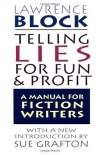Manual For Fiction Writers by Block, Lawrence (classic books to read .TXT) 📗

Book online «Manual For Fiction Writers by Block, Lawrence (classic books to read .TXT) 📗». Author Block, Lawrence
4. JUST GET IT WRITTEN. Frequently I find myself convinced that all I'm doing is turning perfectly good bond paper into garbage. Sometimes I'm right. Sometimes it's an illusion. When I feel this way, it's impossible to tell which will prove to be the case.
The answer, I've found, is simply to get it written, giving myself permission to throw it out later on if it turns out I've produced swill. This is occasionally easier said than done. It's hard to persevere when I'm convinced that the last sentence I typed is utterly wooden. But I frequently find afterward that what seemed horrible while I was writing it looks perfectly fine the next day?or at least no more horrible than the rest of my work. And, on those occasions when I do wind up tearing it up the next morning, at least I've done some work and the momentum of my writing is undisturbed.
5. DON'T TAKE IT TOO SERIOUSLY. The work of any artist requires a certain degree of doublethink. In order to practice my craft day in and day out, I have to be very serious about it. But if I take it too seriously I'll clutch, rendering myself incapable of the relaxed approach necessary for optimum creativity.
Here's a story for illustration. Two retired gentlemen meet, and one complains that he's going nuts. You need a hobby, the other one says. Something to give you an interest in life and a reason for living.
The first is skeptical. You mean like pasting stamps in a book? Doing needlepoint? What kind of a hobby?
I'll tell you, says the other, it doesn't even matter what the hobby is so long as you got one. My hobby, just as it happens, is bee-keeping.
You keep bees? You, living in two and a half rooms on Pitkin Avenue? How many bees do you have, anyway?
Oh, it's hard to say, but about twenty thousand.
Where do you keep 'em?
In a cigar box.
But-but, don't they get all crushed and dead and everything?
So? Listen, it's only a hobby.
It's only a book, I've told myself time and time again. Sometimes it feels like the most important thing in your life, and it seems to be what you do to justify your own existence, but don't take it so seriously. It's just words on paper, it's just a pack of lies. Listen, it's only a book.
That takes the pressure off. Knowing it's only a book, knowing empires won't rise and fall on the strength of it, I'm able to breathe in and breathe out and get the thing written.
Ahem.
Those are my professional secrets, and you're welcome to 'em. I can assure you they work for me. By applying them diligently, I've been able to get this written and in the mail?only two weeks after the due date.
Listen, it's only a column.
CHAPTER 15
Creative Procrastination
PROCRASTINATION'S HAD a bad name ever since 1742, when Edward Young called it the thief of time. (He'd have written that line back in 1739 but he just kept putting it off.) Lord Chesterfield inveighed against putting off until tomorrow what you can do today, lumping the pastime with idleness and laziness. And Thomas DeQuincey, tongue tucked firmly in cheek, saw procratination as the end product of a chain of character deterioration that might begin with a simple act of murder.
We free-lance writers, fixed with the responsibility of scheduling our own time and temperamentally prone to procrastinate, have every reason to agree. And surely this column, designed to send its readers scampering to their typewriters, will take a firm stand against the gentle art of keeping up with yesterday.
Right?
Wrong.
On the contrary, I would submit that procrastination has its place. I'm not endorsing it out of hand, understand. In writing, as in the rest of life, the best way to get things done is to go ahead and do them. They rarely do themselves. And it has been my observation that those writers who sit down and write, day in and day out, are the very writers who get the most accomplished.
So procrastination in general is a massive liability. Creative procrastination, however, can be a definite asset. The trick is to know just when to defer action and when to get busy.
Let me give an example. When I first started writing, about the time the pterodactyl made it onto the endangered species list, I saw to it that as little time as possible elapsed between the onset of an idea and its tranformation into a piece of fiction. I was writing stories then for the surviving crime pulps, and I would typically get a story idea of an afternoon and deliver a finished manuscript to my agent the following morning. More often than not it sold. Not to a very good market, mind you, and not for much money, and the story itself would rarely be memorable in any way, but I was young and that was the best I could do.
Nowadays I do things a little differently.
A couple of months ago, for example, I got a Noteworthy Idea. I conceived of a mystery story in which the murder victim would function as the detective, solving his own murder after it had taken place. I had recently read Life After Life, by Raymond A. Moody, Jr.,





Comments (0)